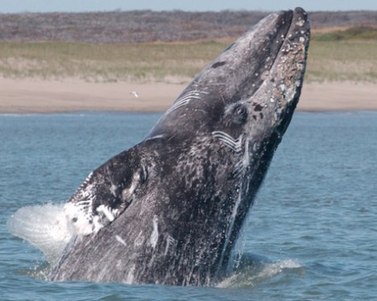Endangered whales flee Russian oil-hit area
Russian oil and gas company Rosneft is conducting oil and gas exploration work that may have caused the critically endangered western gray whale to flee its main feeding ground.
Tests and offshore installment of equipment by Rosneft for a major seismic survey began in late August, despite repeated calls from 12 governments, NGOs, scientists and the public to postpone the survey because of potential risks to the whales.

Rosneft started preparations for the survey last month near Sakhalin Island even though a small number of western gray whales mothers and calves were feeding in the area. Only an estimated 130 western North Pacific grey whales are left in the world, with around 30 breeding females.
Seismic surveys are done by blasting the water with acoustic noise to detect oil and gas deposits under the ocean floor.
Observers from WWF and other NGOs began monitoring Rosneft's activities and the whales in mid-July. It appears that as of Aug. 20, only weeks after Rosneft's activities started, whales feeding in the area had already been affected.
Before those activities began, observers registered 10 to 15 of the whales feeding in the area. Now whales have only been seen migrating across the area – not feeding.
"This is a critical problem as the whales have only a short time in which to consume enough food to last them through the year when they migrate to their breeding and calving grounds," said Wendy Elliott, WWF's whale expert.
The company also has twice conducted seismic surveys at night, which is in violation of international standards, and even Rosnefts' own guidelines.
On August 23, WWF-Russia issued a letter of concern to Russian environmental authorities, requesting an immediate stop to Rosneft's testing.
As part of a WWF initiative, nearly 20,000 people have sent Rosneft emails requesting that the surveys be postponed. However, Rosneft continues to shut out public opposition to its actions with some WWF members reporting that their emails to Rosneft's outgoing President Sergei Bogdanchikov had been blocked.
Scientists from the Western Gray Whale Advisory Panel (WGWAP), a group of eminent whale scientists, have also repeatedly asked the company to postpone the surveys until the whales have left the area. A letter sent from 12 governments to the Russian government asking them to make Rosneft postpone the survey also went unheeded.
"Rosneft is irresponsibly insisting on conducting this survey when they could easily postpone the survey until next year and hold it before the whales arrive," said Aleksey Knizhnikov, Oil & Gas Environmental Policy officer, WWF Russia. "Rosneft may be ignoring public outcry but their negligent behavior will not be forgotten, and they will have to be held responsible for any harm that comes to the whales as a result of these surveys."
Postponing the surveys would also enable Rosneft to develop the precautionary monitoring and mitigation measures that are essential to minimize the impact of the seismic survey on the whales. Monitoring and mitigation measures have already been developed by the WGWAP, and are being used by another company in the same area.
WWF and other NGOs have dozens of observers and boats on Sakhalin Island this year and will be monitoring the test and how it affects the feeding whales.
 0
0 







Go to Forum >>0 Comments